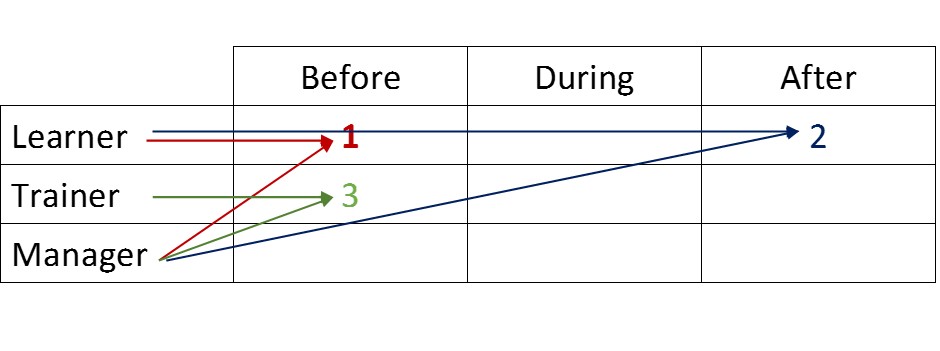The Role Of The Learners Manager
It’s all about ‘Investing In Doing Things Right’ – and I’m talking time rather than money.
An interesting study was carried out and written about in ‘Transfer of Training’ by Mary Broad and John Newstrom.
It looked at 3 key learning influencers
 ie the top 3 ingredients for making learning ‘sticks’ are:
ie the top 3 ingredients for making learning ‘sticks’ are:
- the manager prior to the training
- the trainer prior to training
- the manager after training
But how many of us really invest time prior and post workshops?
Below are 6 strategies for each category ie before, during and after training that should help you make learning stick.
Strategies to use prior to training
- Include managers and learners during the performance and needs assessment as well as the workshop development.
- Talk through the objectives and course content with managers and outline the learners’ managers’ role in supporting the transfer of learning in their everyday work.
- Telephone your learners to discuss the purpose of the training, ask what their expected outcomes are and how achieving these will help them perform their everyday work more effectively.
- Have key, credible executives show their support and commitment to the training by sending eMail messages to each learner and their manager.
- Ask managers to record and communicate what they expect of the learner upon their return to the workplace.
- Set and communicate clear workshop objectives and expected outcomes.
Strategies to use during training
- Tie the workshop content directly to learners’ jobs and the bigger picture. Make the relevance and applicability of new discoveries explicit.
- Work more on the application and ‘how-to’s’ instead of theory.
- Allow time for action planning throughout the workshop and have learners share their action plans (including what, where and how it will be implemented) with a partner.
- Change the format of the workshop to ensure at least 80% of it is learners practicing with new ideas and receiving immediate feedback on their new skills.
- Ask learners to share their ‘hoped for’ and their managers expected outcomes with team members at the beginning of the workshop.
- Teach more by covering less ie concentrate on learners mastering a few key skills rather than hearing about lots of concepts and skills.
Strategies to use after training
- Observe learners back in the workplace. Offer managers suggestions on what and how to observe behaviour changes.
- Ask managers to hold a post workshop briefing on what was learned and learners outlining what they will implement, what additional resources they need and asking for any additional support.
- Make a project assignment part of the workshop. This to be completed between the end of the training and a set follow-up meeting with their manager and training facilitaton.
- Help managers calculate the return on investment (ROI) they should realise if the learner(s) implement their new learning.
- Evaluate and publicise the names of learners that are successfully implementing their new learning and the difference they are making for themselves and the organisation.
- Help managers ensure that all necessary equipment and resources are available for learners to implement new training and that any potential barriers to transfer are removed.
I can hear what you are saying,
“But we don’t have time nor the control over some of these areas.”
I would turn this around and say, “Make time and make it your business, after all it’s our job.” In other words, although it might be difficult at first, push to ensure that any large piece of training (I’m not talking about a one time event) that takes place “Invests in doing it right” and almost guarantees learning transfer.